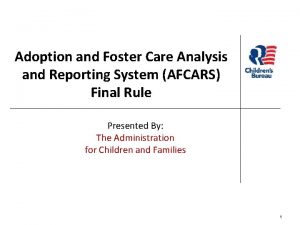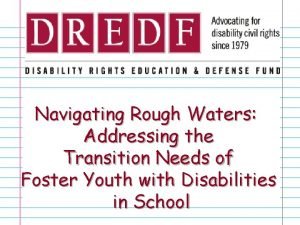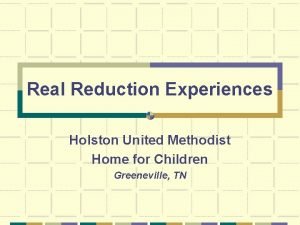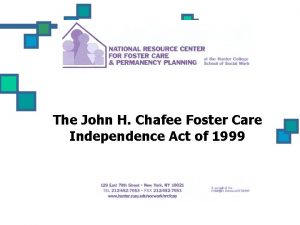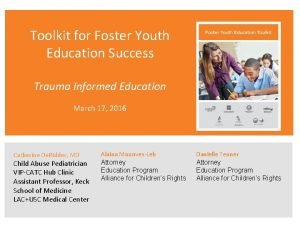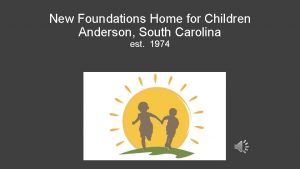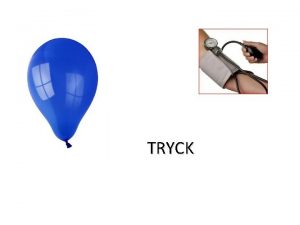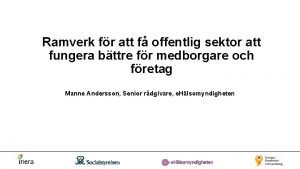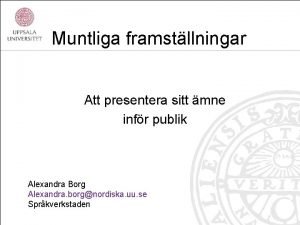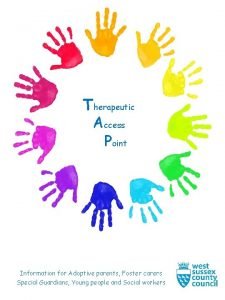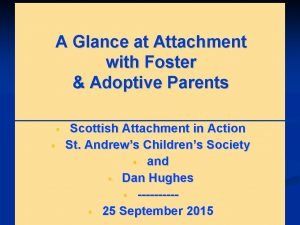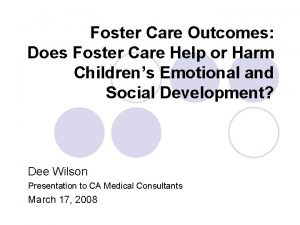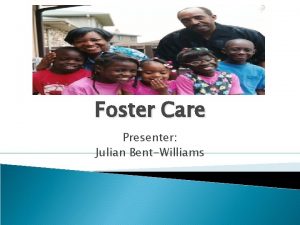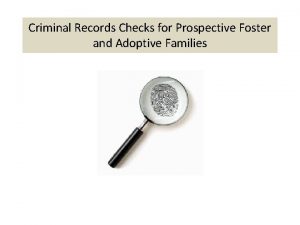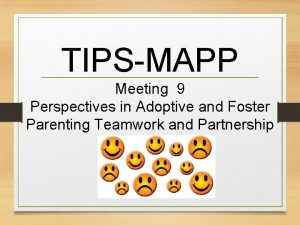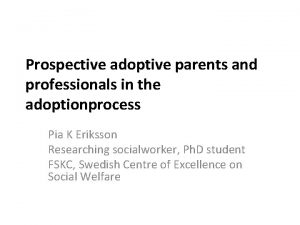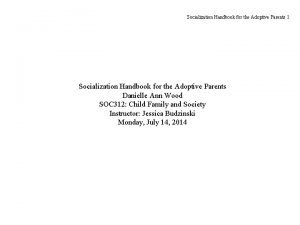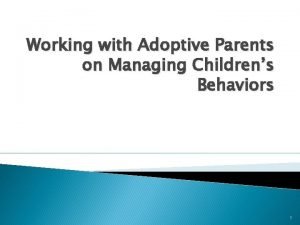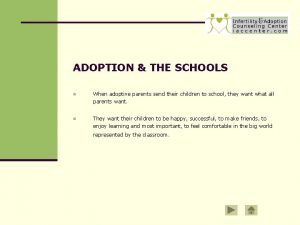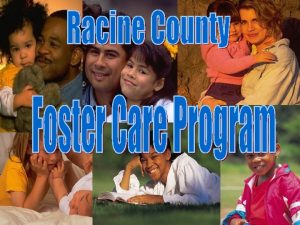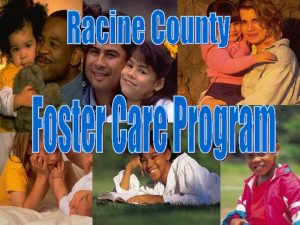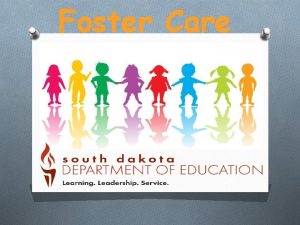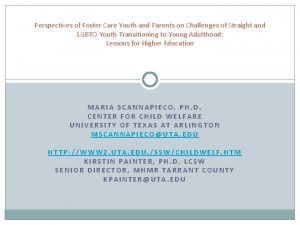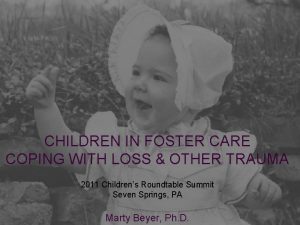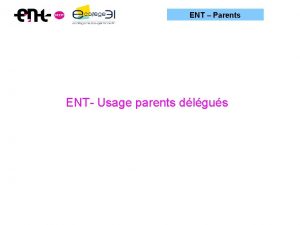Information For Foster Adoptive Parents And Other Care










































- Slides: 42

Information For: Foster/ Adoptive Parents And Other Care Givers

Presented By: Mike P. Mc. Guire 2 nd Judicial District Department of Correctional Services- Iowa

We Will Cover: The Impact of Methamphetamine on the Family System. The implications for Foster/Adoptive Parents and Caregivers. Related System Issues. Strategies to Increase Positive Outcomes for Children, Families, and Caregivers.

DRUGS ARE A SERIOUS PROBLEM 6 th highest criminal caseload of the 94 districts in the United States

DRUGS ARE A SERIOUS PROBLEM 69% 62. 3% 41. 2% 14. 2% Drug Trafficking Cases Meth Cases

SAD FACE OF METH

Methamphetamine Abuse and Child Welfare

Methamphetamine Is: Highly Addictive Initially Very Appealing to Many Initially a Performance Enhancing Drug A Drug That Knows No Boundaries A Drug That Can Severely Impact a Persons Ability to Function Normally and Especially to Parent!

Methamphetamine Users: Most Often Have Other Drug History Substance Use Has Started in Adolescence or Before Have Friends and Acquaintances that are Drug Users Rarely Pay for the Drug Initially Usage Often Quickly Escalates “Just Live to Use Meth”

The Impact on Families: Issues of Abuse and Neglect are Significant. The Exposure of Children to Toxins Where Meth is made or Used is a Huge Problem. Infants Who Were Perinatally Exposed Can Have a Wide range of Issues Living Environment is Often Very Poor In Iowa Estimates Are Approximately 50% of Child Welfare Cases are Meth Related* Iowa Dept. of Human Services “Methamphetamine and Child Welfare-Carol Gutchewsky

HEALTHY AND TROUBLED FAMILIES Healthy Families Provide Safety Self-care Open communication Individualized roles Continuity Troubled Families Safety jeopardized Co-dependency Closed communication Family roles Chaos Information from the Children of Alcoholics Foundation

Children of Meth Using Parents Are Often in the Caretaker Role Learn Not to Trust Have Issues with Attachment Are Often Exposed to Violence, Drug Sales, Sexual Issues, and Drugs Themselves

Methamphetamine Exposed Infants Dr. Rizwan Shah, MD, FAAP Blank Children’s Hospital-Des Moines, Iowa Symptoms May Vary and Can Be Difficult to Diagnose Treatment Should be Based on Symptoms and Not Merely the Fact that Infant Was Drug Affected May be at Risk for Problems Later in Life Not All Infants/Children Exposed Will Have Problems

Dr. Shah’s Study Included 368 Infants and Children with Methamphetamine Accounting for 76% of the Cases

Symptoms of Meth Exposed Infants and Children I NB to 4 Weeks (Dopamine Depletion Syndrome) Lethargic-Excessive Sleep Poor Suck and Swallow Coordination Sleep Apnea

Symptoms of Meth Exposed Infants and Children II Four Weeks to Four Months Age CNS Immaturity (effects on motor development) Sensory Integration Problems-Tactile, Defensive, Texture Issues Neurobehavioral Symptoms-Interaction. Social Development

Symptoms of Meth Exposed Infants and Children III Six Months to Eighteen Months The “Honeymoon Phase” Symptom Free Period

Symptoms of Meth Exposed Infants and Children III Eighteen Months to Five Years Sensory Integration Deficit (same as II) Less Focused Attention Easily Distracted Poor Anger Management Aggressive Outbursts Speech Language and developmental Problems can occur

Despite The Challenges These Kids Face: We Must Guard Against Labeling!

Methamphetamine and Parenting Understanding the Use of Methamphetamine and Its Various Effects is Helpful in Understanding its Impact on Parenting

METHAMPHETAMINE Psychological Effects Irritability Anxiety Hallucinations Paranoia Cognitive impairment Aggressiveness

METHAMPHETAMINE Behavioral Signs Insomnia Extreme hyperactivity, excessive talkativeness Change in attitude or personality Changes in friends or hiding of associates Change in activities Drop in performance Loss of interest in family

Physical Signs of Use Weight Loss Darkness Under the Eyes-”Sunken In” Oily hair/Skin Odor Teeth Problems Skin Sores (“Crystal Mites”) Dilated Pupils Can’t Sit Still



The Hierarchy of Users Will Frequently Escalate in: How They Use How Much They Use How Frequently They Use

How Used: Drink It Snort It Smoke It Shoot It


Not All Meth is Created Equally Can be significant differences in Purity Powdered Meth vs. Ice or Glass Cutting or “Stepping On It” Changes Purity


Issues In Foster Care And Adoption Safety Issues Foster/Adoptive Parents Need Information Training Issues Working With Birth Families Support For Families Relative Caregiver Issues

Safety Issues Starts with Making Sure That DEC (Drug Endangered Children) Protocols are Followed National DEC Protocol Offers Guidelines for Decontamination, Evaluation, Treatment, and Placement for Children Found in Drug Labs.

Providing Information To Foster/Adoptive Parents Want and Need to Know as Much Case History as Possible. This Should Include Information About the Family Background, Degree and Type of Drug Exposure Also, Informing Families as Soon as Possible What is Expected of Them is Vital

Families Need Training Should be Practical, Realistic, and Offer Strategies that Help Families Deal with Drug Affected Kids and Parents Information on Drug Awareness Gives Families a Working Knowledge Training Should Also Address the Effects of Actual, Environmental, and Social Exposure to Drugs.

Working With Birth Families Once Kept Apart in Many States, Foster and Adoptive Parents Are being Asked to do More with Birth Families Working Together Helps to Increase Positive Outcomes for Children and Families Foster/Adoptive Parents Should Receive Specific Training on This Topic. Safety for Families Working with Meth Affected Families Must be a Top Priority!

Support For Families Many States Have Statewide Foster/Adoptive Parent Support Associations NFPA and NACAC Provide Resources on a National Level Many Local Groups Exist for Families as Well Specialized Support Groups can be Helpful All of These Types of Groups Provide Support, Training, Resources for Families

Relative Caregiver Issues Presents many of the Same Issues that Foster/Adoptive Parents Face-However, Additional Dynamics are Present!

Other “System” Issues Child Welfare Systems Often Too Overloaded to Provide Support to Families Issues with “Concurrent Planning” Can be Difficult For Families Lack of Training for System Professionals About Drugs Addicted Parents Trying to “Beat The System” and Kids Being Returned to Unsafe Situations

The “Time Paradox” Clock Starts Ticking When Child Removed Effective Meth Recovery Needs to Be Long term Parents Dealing With Loss, Grief, Recovery Issues, etc. Time Can “Run Out” Before Issues Are Appropriately Dealt With

Strategies That Can Help Coordinated Efforts That Include Prevention, Treatment, and Enforcement Working Closely With Child Welfare Agencies Utilizing Treatment Approaches that Offer Long Term Support and Monitoring (i. e. Drug Court) Promoting an Atmosphere of Teamwork Between Foster/Adoptive Families, Birth Families, and Child Welfare Agencies is Best Practice Licensing Practices that Promote Smoother Transitions to Permanency (Dual Licensing)

The Iowa Foster and Adoptive Parent Association Offers Support and Training to Families. Liaison program Adoption Information Specialist FAIR Line Special Activities Throughout the Year

Training 6 Hour Comprehensive Drug Awareness 6 Hour “Working with Birth Families” DEC Training Numerous Other 2 -6 Hour Classes for families
 How does avery’s adoptive mother describe who avery is?
How does avery’s adoptive mother describe who avery is? Adoption and foster care analysis and reporting system
Adoption and foster care analysis and reporting system Mes grands-parents mes parents et moi frida kahlo
Mes grands-parents mes parents et moi frida kahlo Parents parents
Parents parents Autoportraits de frida kahlo
Autoportraits de frida kahlo Effects of multiple placements in foster care
Effects of multiple placements in foster care Effects of multiple placements in foster care
Effects of multiple placements in foster care Holston homes foster care
Holston homes foster care Chafee foster care program
Chafee foster care program Trauma informed care for foster youth
Trauma informed care for foster youth New foundations foster care
New foundations foster care Margo and her parents (visit-visits) each other often
Margo and her parents (visit-visits) each other often Primary, secondary, tertiary care
Primary, secondary, tertiary care Self initiated other repair
Self initiated other repair Video spectral comparator (vsc)
Video spectral comparator (vsc) Foster and freeman vsc 80
Foster and freeman vsc 80 Foster and maintain business relationships
Foster and maintain business relationships Chandelier electrical symbol
Chandelier electrical symbol Formuö
Formuö Typiska drag för en novell
Typiska drag för en novell Nationell inriktning för artificiell intelligens
Nationell inriktning för artificiell intelligens Returpilarna
Returpilarna Varför kallas perioden 1918-1939 för mellankrigstiden
Varför kallas perioden 1918-1939 för mellankrigstiden En lathund för arbete med kontinuitetshantering
En lathund för arbete med kontinuitetshantering Personalliggare bygg undantag
Personalliggare bygg undantag Vilotidsbok
Vilotidsbok Anatomi organ reproduksi
Anatomi organ reproduksi Densitet vatten
Densitet vatten Datorkunskap för nybörjare
Datorkunskap för nybörjare Stig kerman
Stig kerman Debattartikel struktur
Debattartikel struktur Autokratiskt ledarskap
Autokratiskt ledarskap Nyckelkompetenser för livslångt lärande
Nyckelkompetenser för livslångt lärande Påbyggnader för flakfordon
Påbyggnader för flakfordon Arkimedes princip formel
Arkimedes princip formel Svenskt ramverk för digital samverkan
Svenskt ramverk för digital samverkan Urban torhamn
Urban torhamn Presentera för publik crossboss
Presentera för publik crossboss Vad är ett minoritetsspråk
Vad är ett minoritetsspråk Bat mitza
Bat mitza Klassificeringsstruktur för kommunala verksamheter
Klassificeringsstruktur för kommunala verksamheter Fimbrietratt
Fimbrietratt Bästa kameran för astrofoto
Bästa kameran för astrofoto

